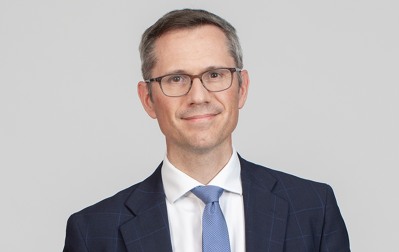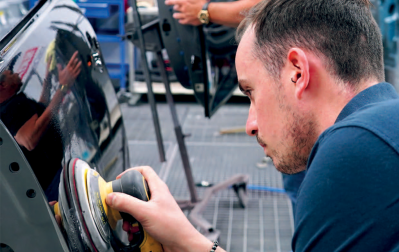Floods, storms, drought, hail: Covéa publishes a white paper on climate risk modelling in mainland France
- Prevention
- Covéa
03 February 2022
Experts from Covéa’s Major Risks division joined forces with RiskWeatherTech to research the effects of climate change on insurance claims.
The study, the only one of its kind on the market, is based on modelling of climate changes and models of damages developed by Covéa on the basis of past claims and analysis of its home insurance risk portfolios in mainland France. It quantifies the expect changes in damages relating to flooding, drought, hail and storms as a result of climate change between now and 2050.
The white paper highlights an expected sharp rise in claims over the coming years, in particular in relation to flooding and drought.
It also shows a change in the shape of climate-related claims, with a growing proportion of incidents relating to natural disasters.
Covéa has also drawn on its expertise in the are of climate risk modelling to develop research programmes to help its members to cope with the growing number of claims.
For example, Covéa has invested in the research and development of innovative solutions to reduce the shrinking and swelling of clay soils in order to make buildings more resilient to drought.
“A leading name in non-life insurance, Covéa has a front line position in observing and assessing the consequences of climate change. The Group believes that prevention is a core pillar of efforts to ensure housing can withstand the impact of climate change. Drawing on our expertise in anticipating and managing climate risk, we aim to continue with our research in order to limit the negative effects on our exposures and claims rate, and carry on protecting our members over the long term,” comments Paul Esmein, Deputy Chief Executive Officer of Covéa.
“RiskWeatherTech, a specialist in modelling natural risks and the impact of climate change, has worked with Covéa for a number of years on anticipating and managing climate risk. More generally, we are eager to support the most vulnerable sectors and/or those that are most aware of their exposure to climate change in order to help them make the right decisions in terms of adaptation and mitigation,” adds Blandine L’Hévéder, Chief Scientific Officer at RiskWeatherTech.
Nous recevons donc Paul Esmein, directeur général adjoint du groupe Covéa.
Bonjour. On va parler de changement climatique qui fait peser un risque majeur évidemment sur le secteur de l'assurance. Il y a un cyclone à la Réunion en ce moment, mais les risques climatiques vont augmenter dans les prochaines années : les risques d'inondation, les risques de sécheresse, les risques d'orages. L'avenir n'est pas rose.
Non, effectivement. Ce qu'on met en lumière dans cette étude, c'est le fait qu'il va y avoir un certain nombre de risques, notamment les inondations et la sécheresse, dont on prévoit une augmentation assez forte dans les décennies à venir puisque l'étude porte sur la période d'ici à 2050.
On le voit effectivement, les crues... On a vu en France beaucoup de crues éclairs assez spectaculaires. Et vous dites avec Risk Weather Tech, qui organise l'étude avec vous, que ce risque va grimper de 130 % d'ici 2050. Or, les inondations aujourd'hui pour les assureurs, c'est le premier pôle d'indemnisation au titre des catastrophes naturelles.
Oui. En réalité, il faut distinguer deux types d'inondations qui dans les ressorts ne sont pas les mêmes : les inondations de plaine, l'exemple type c'est la crue de la Seine comme on l'a vu en 2016, et les inondations liées à des crues torrentielles avec les bilans humains qui peuvent être parfois très lourds, comme ce qu'on a eu à Saint-Martin-Vésubie il y a un peu plus d'un an. Mais dans les deux cas, effectivement, on prévoit des augmentations qui sont de plus de 100 % de la charge économique dans les décennies à venir.
Un Français sur trois est assuré par Covéa. Vous regroupez les enseignes GMF, MAAF et MMA. Face à ce genre de données, quelle stratégie adoptez-vous en tant qu'assureur ?
Précisément, c'est la raison pour laquelle on a voulu faire cette étude. C'est moins d'avoir des prévisions ou des anticipations très fines, puisqu'on est de toute façon sur un horizon très lointain, que de mettre le sujet sur la table pour essayer d'ouvrir ce débat qui selon nous est insuffisamment traité, celui de l'adaptation au changement climatique. Il faut vraiment qu'on réfléchisse à ces mécanismes de prévention et ce ne sont pas des acteurs privés seuls qui peuvent porter ce sujet.
Ça veut dire quoi ? Ça veut dire qu'au fond, quand vous mettez ça sur la table, vous dites qu'il faut agir davantage, par exemple sur les zones inondables, ne plus construire de maisons comme on le fait aujourd'hui ? Ou est-ce que vous dites préparez-vous à ce qu'on augmente les tarifs ?
Il y a des choses de nature différente. Si on parle de prévention, il y a en synthèse ce qu'on peut faire avant la construction et ce qu'on peut faire après. Avant, c'est surtout du ressort de l'État, c'est par exemple les plans préventifs ou les plans de continuité qui sont mis en place au niveau de l'État ou au niveau des communautés ou des intercommunalités. Il y a aussi les études de sol, par exemple, pour éviter de construire sur un sol argileux.
Et vous avez vu parfois il y a des interdictions de construire, pourtant il y a des constructions. Est-ce que vous pourriez, en tant qu'assureur, par exemple dire : "Eh bien, moi je n'assure plus des maisons récentes qui ont été construites alors même qu'on savait que cette zone était inondable" ? Est-ce qu'on peut faire ça en tant qu'assureur ?
Je pense qu'il faut faire le distinguo entre ce qui est du ressort des pouvoirs publics et ce qui est du ressort des assureurs. Avant tout, c'est ça.
ça pourrait être dissuasif, si vous disiez, vous, communauté des assureurs, vous disiez "nous, on n'assure plus si vous construisez une maison alors qu'on vous dit que c'est une zone inondable", on n'assure plus. C'est pas possible ça, légalement, juridiquement, c'est pas possible.
Je pense qu'il faut quand même laisser la prérogative sur l'État, aux communautés, sur ce sujet.
C'est-à-dire que vous, vous dites "nous, on assure certes, mais aujourd'hui mais on ne fait pas la loi". Notre responsabilité, c'est d'assurer effectivement. Il y a des cas différents à considérer, mais notre responsabilité avant tout, c'est d'assurer les risques. On est là pour ça.
On parle de prévention, il y a aussi des choses qu'on peut faire après la construction. Il y a des choses qui sont déjà efficaces, parce que je pense notamment aux portes étanches, ce qu'on appelle les batardeaux, pour prévenir les inondations. Il y a aussi des choses que vous pouvez financer en tant qu'assureur, par exemple.
C'est toute la question. Aujourd'hui, il y a des financements possibles, notamment grâce à des aides de ce qu'on appelle le fonds Barnier. Maintenant, c'est vrai que si ça tend à se généraliser, et on voit que les besoins vont probablement augmenter dans les décennies à venir, ce n'est pas en l'état le fonds Barnier qui est suffisant pour faire face à cette problématique.
Mais il va falloir trouver des solutions très concrètes, parce que quand on voit par exemple à chaque catastrophe, ne serait-ce qu'en France, le nombre d'agriculteurs très touchés par le changement climatique qui ne sont pas assurés parce que les risques sont trop grands et les coûts sont trop élevés, est-ce qu'il n'y a pas un risque de cassure entre ces professionnels qui subissent directement ce changement et les assureurs ?
Vous avez tout à fait raison, mais je pense qu'il faut vraiment prendre les problèmes individuellement. C'est-à-dire que les risques qui pèsent sur les situations des agriculteurs ne sont pas du tout les mêmes, même si le sous-jacent peut être identique, que ceux qui portent sur la construction ou sur le secteur automobile. Donc il faut vraiment trouver des solutions à chaque problème. Il y a une réflexion en cours sur les risques agricoles, il faut qu'on avance dans cette direction. Je pense que le fond du problème aujourd'hui, c'est qu'il y a un trou d'assurance. Il y a un très grand nombre d'agriculteurs qui ne sont pas assurés contre ces périls.
Est-ce que, quoi qu'on fasse, même si on fait plus de prévention, même si vous sensibilisez les pouvoirs publics à ces risques, je le rappelle, à 130 % de crues en plus d'ici 2050, pareil pour la sécheresse, 60 % de plus, est-ce qu'il faut quand même qu'on se prépare à ce que les primes d'assurance augmentent ?
Alors, si la question c'est "est-ce que lorsque le risque augmente, les prix augmentent ?", je peux difficilement vous dire maintenant. Cette étude n'a pas du tout été faite pour justifier des augmentations de tarifs. On est sur un horizon de 30 ans, on ne raisonne pas en matière tarifaire à aussi long terme parce qu'il y a beaucoup trop d'incertitudes. Nous, vraiment, cette contribution, ce livre blanc, se veut précisément une contribution au débat qu'on souhaite mettre sur la table sur la nécessaire adaptation de nos sociétés au changement climatique.
Mais très rapidement, les risques sont de plus en plus grands, que ce soit face aux changements climatiques, face aux cyberattaques, face à des pandémies comme celle qu'on vient de vivre. Est-ce que les assureurs, est-ce que l'assurance encore, finalement, peut résister face à ces risques trop grands dans les décennies qui viennent ? Est-ce que ce sera encore le temps de l'assurance ?
La question que vous posez au fond, c'est la question de l'assurabilité, c'est-à-dire est-ce qu'on peut assurer certains risques. Le fond du problème, c'est toujours la question de l'aléa, c'est-à-dire que pour qu'un risque soit assurable, il faut qu'il y ait un aléa. Qu'il soit connu et quantifié. Et si on revient à la question des climatiques, c'est vrai que s'il y a, à un endroit donné, de manière certaine ou quasi certaine, une inondation tous les ans, ce n'est plus assurable. Cela dit, avant de ne plus être assurable, ce n'est plus vivable. Mais au-delà de ces situations qui sont quand même extrêmes, et ce n'est pas du tout ce qu'on met en lumière dans le rapport, l'assurance est précisément là, et c'est notre raison d'être, pour assurer ces situations difficiles.
Merci beaucoup Paul Esmein, directeur général adjoint de Covéa, d'avoir été dans Good Morning Business.
Consult Covéa white paper on climate change:
Our latest news
All the latest Group news-

- Governance
- Covéa
2023 Integrated Report: Covéa reasserts its leading position and its commitment to a sustainable future
15 July 2024 -

- Governance
- Covéa
Michael Walker has been appointed Group Chief Financial Officer of Covéa
01 July 2024 -

